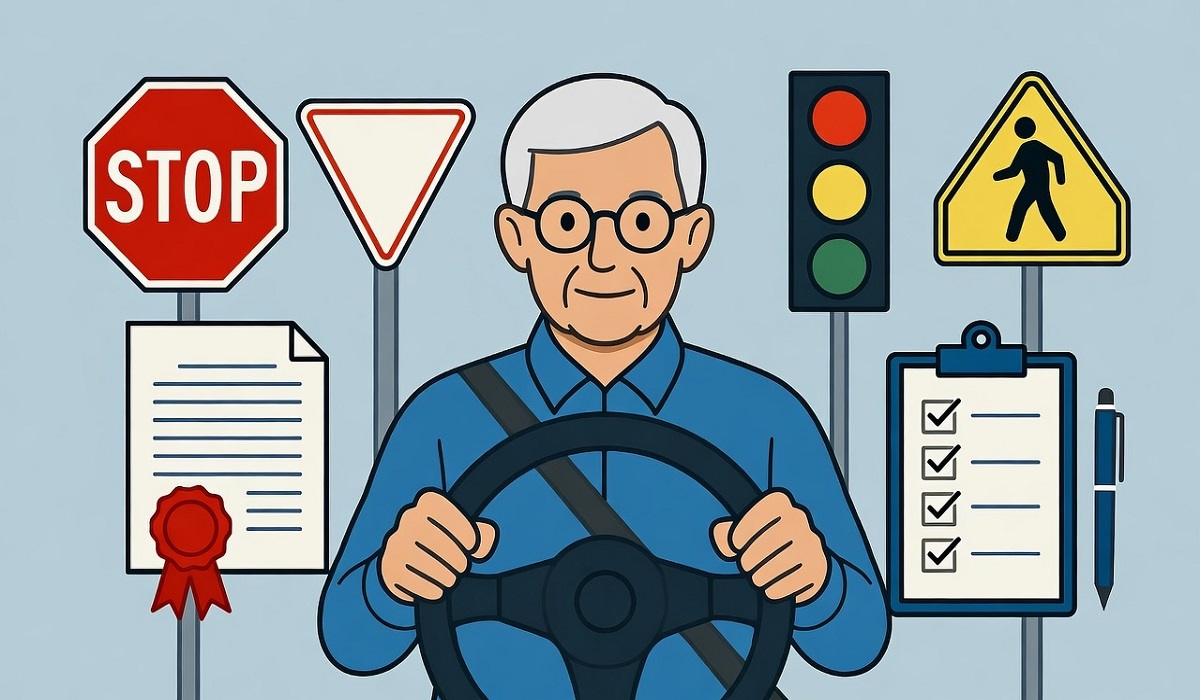A viral wave of stories this year claimed a sweeping, nationwide change to how Americans aged 70 and older renew driver’s licenses — including frequent vision, cognitive and on-road tests. That narrative is false: there is no single federal rule imposing new, uniform tests on all drivers over 70. However, state-level laws and proposals continue to vary widely, and some states have recently adjusted their approaches to senior licensing. Readers should expect patchwork rules that differ by state rather than a single national mandate.
What actually changed — and what didn’t
The most important fact for seniors and their families: the U.S. Department of Transportation has not issued a new nationwide law requiring periodic cognitive or road tests for all drivers age 70 and older. Multiple fact-checking organizations reviewed circulating claims and found them inaccurate. Instead, driver-licensing requirements — including whether a vision exam, in-person renewal or road test is required at certain ages — are set by each state. That means a rule that applies in one state may not exist in another.
At the same time, several states maintain or are considering targeted rules for older drivers. The Governors’ Highway Safety Association and other policy trackers list dozens of state provisions that require vision checks, limit mail or online renewals for older age groups, or allow family or medical professionals to report concerns about a driver’s fitness. Those state rules are the practical instruments that affect most senior motorists today.
Recent state action: Illinois as a case study
While there is no federal overhaul, states are still legislating. Illinois’ recent Road Safety & Fairness Act (House Bill 1226) provides a clear example of how state policy can change the rules for older drivers. The law, signed in mid-August 2025, raises the age at which drivers are subject to mandatory behind-the-wheel testing for renewal: under the new law only drivers age 87 and older will face an annual road test requirement, with in-person renewals required for people 79 and older. The measure also creates pathways for family reporting and tailored re-examinations for those with driving records that signal risk. Supporters framed the law as removing an arbitrary age-based barrier while keeping safety checks for those who need them.
Illinois’ change illustrates two wider trends: policymakers are balancing concerns about roadway safety with pushback against policies that treat age as a proxy for incompetence; and many reforms are focusing on targeted, evidence-based screenings rather than blanket, age-based stripping of driving privileges.
What experts and advocacy groups say
Advocacy groups and road-safety organizations emphasize nuance. AARP, which follows state renewal practices closely, notes that while many states require vision screening or in-person renewals for older drivers, requirements are inconsistent and tailored approaches (for example, more frequent screening for drivers with medical conditions) are generally recommended over one-size-fits-all rules. Public-health agencies likewise point to data showing that older adults are both an expanding driver population and one with specific vulnerabilities (vision, reaction time, medical conditions), which supports targeted screening and family/physician reporting mechanisms.
Fact-checking outlets have been explicit: the social-media story of a single federal edict requiring cognitive exams, annual road tests at 87, and tiered renewal intervals for 70–80, 81–86 and 87+ is misinformation. Journalists and legal analysts warn consumers to consult official state DMV resources rather than viral posts.
What this means for drivers and families
Practical steps for drivers and families concerned about licensing:
• Check your state DMV rules. Because rules are state-specific — and can change — the authoritative source is your state’s Department of Motor Vehicles or Secretary of State website. The GHSA maintains summaries of state provisions that can be a helpful starting point.
• Prepare for vision and in-person requirements. If your state requires in-person renewal after a certain age, plan ahead — many DMVs require appointments or have limited openings. A vision test is the most common state requirement.
• Talk to health providers. Conditions such as cataracts, untreated sleep apnea, progressive neurological disease or medication side-effects can affect driving. Doctors cannot automatically take away licenses, but they can document concerns and advise on safety. Several states also allow physicians or family members to report safety concerns to licensing authorities.
• Consider alternatives and adaptations. When driving becomes risky, options include restricted licenses (daylight-only, local-area), refresher driving courses for older adults, and arranging alternate transportation — Lyft/Uber, family rides, paratransit or community shuttles. AARP and many state agencies publish local resources to help older adults maintain mobility without unnecessary risk.
Conclusion
The headline many readers saw — that a new federal “US driving license rule for seniors” requires uniform testing for drivers over 70 — is inaccurate. Rather than a national mandate, the landscape is a mosaic of state laws, evolving policy debates and occasional state reforms like Illinois’ HB1226. For seniors and their families, the immediate takeaway is simple: check state sources, prepare for vision and in-person renewal rules where they exist, and engage healthcare providers early if medical issues could affect driving. Those steps will keep drivers informed, preserve independence where it’s safe to do so, and protect public safety where it isn’t.









